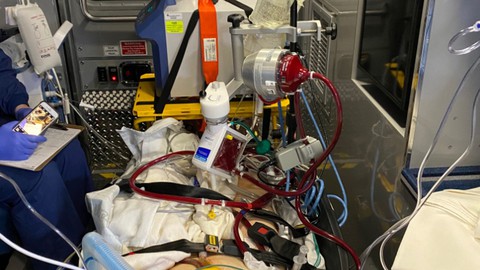
ECMO : In Hospital and Transport
ECMO : In Hospital and Transport, available at $19.99, has an average rating of 3.94, with 28 lectures, based on 9 reviews, and has 90 subscribers.
You will learn about Define ECMO and understand the purpose Understand the separate circulation physiology between the patient and mechanical unit Understand the most common emergencies with an ECMO patient Understand interventions for the most common emergencies This course is ideal for individuals who are Intermediate critical care nurses, paramedics, transport technicians, resident doctors, respiratory therapists It is particularly useful for Intermediate critical care nurses, paramedics, transport technicians, resident doctors, respiratory therapists.
Enroll now: ECMO : In Hospital and Transport
Summary
Title: ECMO : In Hospital and Transport
Price: $19.99
Average Rating: 3.94
Number of Lectures: 28
Number of Published Lectures: 28
Number of Curriculum Items: 28
Number of Published Curriculum Objects: 28
Original Price: $19.99
Quality Status: approved
Status: Live
What You Will Learn
- Define ECMO and understand the purpose
- Understand the separate circulation physiology between the patient and mechanical unit
- Understand the most common emergencies with an ECMO patient
- Understand interventions for the most common emergencies
Who Should Attend
- Intermediate critical care nurses, paramedics, transport technicians, resident doctors, respiratory therapists
Target Audiences
- Intermediate critical care nurses, paramedics, transport technicians, resident doctors, respiratory therapists
This course walks the student through the basic physiology of the ECMO system. In addition, it teaches about the most common emergencies and how to intervene with limited resources, especially in transport. Students that would benefit from this course in any critical care nurse, paramedic, or physician.
Extracorporeal membrane oxygenation (ECMO), a term used to describe oxygenation that occurs outside of the body, is an increasingly common means of supporting the most critically ill patients. Because of the invasiveness and high probability of serious complications during ECMO, it is typically indicated only when there is a high likelihood of death with conventional treatment. With continued improvements in technology and increasing clinical experience, transport clinicians are increasingly likely to be called on to care for ECMO patients.
Highlights include:
-
Critical care transport clinicians must appreciate the differences between venovenous and venoarterial extracorporeal membrane oxygenation (ECMO) as well as common indications for each and the physiology of both configurations
-
Traditional monitoring techniques such as peripheral capillary oxygen saturation may not be reliable
-
Preparation for emergencies is imperative because decompensation can be rapid and masked until death occurs
-
ECMO is a bridge to another option and is not a cure
-
Critical Care Providers must know if a patient is a candidate for ECMO support prior to making the decision
Course Curriculum
Chapter 1: Introduction
Lecture 1: Introduction
Lecture 2: Objectives
Lecture 3: WHAT IS ECMO
Lecture 4: WHY VA ECMO
Lecture 5: ACCESS SITES/LINES
Lecture 6: Different Types
Lecture 7: Transport Specifics
Lecture 8: Pump Physiology
Lecture 9: Patient Physiology
Lecture 10: Lecture 10 with Quiz
Chapter 2: Emergencies and Complications
Lecture 1: Bleeding
Lecture 2: Blood Pressure Management
Lecture 3: Loss of Flow
Lecture 4: Hypotension
Lecture 5: Oxygenation Part 1
Lecture 6: Oxygenation Part 2
Lecture 7: Oxygenation Part 3
Lecture 8: Lecture with Quiz #2
Lecture 9: Recirculation
Lecture 10: Differential Hypoxia
Lecture 11: Loss of Pulsatility
Lecture 12: End Tidal
Lecture 13: Air Embolism
Lecture 14: Pump Failure
Lecture 15: Hypothermia
Lecture 16: Circuit Rupture
Lecture 17: Decannulation
Chapter 3: Closing and Summary
Lecture 1: Brief Closing
Instructors
-
Jennifer Vieira
Instructor
Rating Distribution
- 1 stars: 1 votes
- 2 stars: 0 votes
- 3 stars: 1 votes
- 4 stars: 5 votes
- 5 stars: 2 votes
Frequently Asked Questions
How long do I have access to the course materials?
You can view and review the lecture materials indefinitely, like an on-demand channel.
Can I take my courses with me wherever I go?
Definitely! If you have an internet connection, courses on Udemy are available on any device at any time. If you don’t have an internet connection, some instructors also let their students download course lectures. That’s up to the instructor though, so make sure you get on their good side!
You may also like
- Best Emotional Intelligence Courses to Learn in March 2025
- Best Time Management Courses to Learn in March 2025
- Best Remote Work Strategies Courses to Learn in March 2025
- Best Freelancing Courses to Learn in March 2025
- Best E-commerce Strategies Courses to Learn in March 2025
- Best Personal Branding Courses to Learn in March 2025
- Best Stock Market Trading Courses to Learn in March 2025
- Best Real Estate Investing Courses to Learn in March 2025
- Best Financial Technology Courses to Learn in March 2025
- Best Agile Methodologies Courses to Learn in March 2025
- Best Project Management Courses to Learn in March 2025
- Best Leadership Skills Courses to Learn in March 2025
- Best Public Speaking Courses to Learn in March 2025
- Best Affiliate Marketing Courses to Learn in March 2025
- Best Email Marketing Courses to Learn in March 2025
- Best Social Media Management Courses to Learn in March 2025
- Best SEO Optimization Courses to Learn in March 2025
- Best Content Creation Courses to Learn in March 2025
- Best Game Development Courses to Learn in March 2025
- Best Software Testing Courses to Learn in March 2025






















